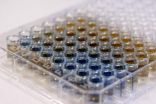(Press-News.org) Biogenic amines may be one of the factors responsible for symptoms such as headaches, gastro-intestinal disorders, shortness of breath, fall in blood pressure, and even unconsciousness and cardiac arrhythmia in severe cases. Histamine, one of the best known members of this group, can cause serious physical problems. Biogenic amines can be produced in the body by natural metabolic activities but are also ingested in larger quantities with food. They play a special role in microbiologically produced food such as wine, beer, cheese, and sauerkraut. In a joint project Johannes Gutenberg University Mainz (JGU) and the Dienstleistungszentrum Ländlicher Raum Rheinpfalz (DLR) have developed measures to identify and reduce biogenic amines in wine, where they can be of particular risk to human well-being.
The goal of these investigations was to avoid high concentrations of biogenic amines in wine. The corresponding investigations were performed in the Institute of Microbiology and Wine Research at Mainz University and the Dienstleistungszentrum Ländlicher Raum Rhenish Palatinate in Neustadt in a joint project sponsored by the Research Association of the German Food Industry (FEI). "It is important to make efforts in order to reduce biogenic amines in wine, since this problem shall increase in future," predicts Professor Dr. Helmut König of the JGU Institute of Microbiology and Wine Research (IMW). Compared to other microbiologically processed food such as cheese the concentration of biogenic amines in wine may be low. However, their effect on sensitive human beings may be strongly increased during simultaneous ingestion of wine and other problematic food since alcohol significantly impairs the body's ability to metabolize biogenic amines.
Therefore, Helmut König's team and the enologists of the working group of Ulrich Fischer in Neustadt have developed "Practicable Milestones" in order to enable wine-makers to lower the risk of the production of biogenic amines. There currently is no regulatory requirement regarding the upper limits for biogenic amines in wine. However, in view of the health risks and the need to prevent the development of off-flavors that can be caused by some bacteria, wine-makers shall take measures in respect to cellar and wine producing techniques now. The addressed problems may increase in future as a result of climate change, because higher temperatures will promote the growth of undesirable bacteria on the grapes. It has been shown that the production of biogenic amines will be enhanced due to elevated pH values. An earliness of the ripening period of the grapes may lead to an increase of the pH value of the grape juice.
Preventative and curative measures include the use of tested starter cultures, the early detection of the presence of biogenic amine-forming bacteria by molecular methods and procedures to prevent their growth, for example the application of flash pasteurization or the removal of biogenic amines with the help of bentonite or yeast cell walls. The most economic preventive measure is to lower the pH value by adding tartaric acid. This is already permitted in the warmer climate zones of the EU and in non-European countries, but German wine-makers are currently prohibited to apply this measure. However, in the last years an exemption to this regulation was granted.
### END
Development of measures to prevent wine indispositions
Scientists at Johannes Gutenberg University Mainz and the DLR develop measures to prevent health problems associated with biogenic amines in wine
2012-11-07
ELSE PRESS RELEASES FROM THIS DATE:
Recent studies bring fossils and genes together to piece together evolutionary history
2012-11-07
Paleontology, with its rocks and fossils, seems far removed from the world of developmental genetics, with its petri dishes and embryos. Whereas paleontology strives to determine "What happened in evolution?", developmental genetics uses gene control in embryos to try to answer "How did it happen?" Combined, the two approaches can lead to remarkable insights that benefit both fields.
In the current issue of the Journal of Vertebrate Paleontology, Hans Thewissen, Ingalls-Brown Professor at Northeast Ohio Medical University (NEOMED), and his colleagues review recent studies ...
New method could help communities plan for climate risk
2012-11-07
CAMBRIDGE, Mass. -- Climate scientists cannot attribute any single weather event — whether a drought, wildfire or extreme storm — to climate change. But extreme events, such as Hurricane Sandy, are glimpses of the types of occurrences the world could be more vulnerable to in the future. As the devastation left by Sandy continues to reverberate, decision-makers at every level are asking: How can we be better prepared?
MIT researchers have developed a new tool to help policymakers, city planners and others see the possible local effects of climate change. Its regional projections ...
Synthetic biofilter wins through to the top 'Sweet 16' in Boston
2012-11-07
This press release is available in German.
Months of painstaking work in the laboratory at Bielefeld University's Center for Biotechnology (CeBiTec) have paid off: the 15 students participating in this year's 'international Genetically Engineered Machine competition' (iGEM) at the Massachusetts Institute of Technology (MIT) have good reason to celebrate. The goal of their project was to develop a biological filter that removes estrogen from drinking water. It was a success: they managed to produce enzymes that break down the hormone. On Monday 5 November, the competition ...
Longer use of hormonal contraception during midlife predicts better cognitive function later
2012-11-07
New Rochelle, NY, November 7, 2012—Premenopausal use of hormonal contraceptives may improve the cognitive abilities of women in midlife and for years afterward. This finding may have implications for prevention of declining cognitive function that occurs with advancing age and in diseases such as Alzheimer's. The beneficial effects of hormones increase the longer a woman uses them, as described in a study published in Journal of Women's Health, a peer-reviewed publication from Mary Ann Liebert, Inc., publishers. The article is available free on the Journal of Women's Health ...
Teva to present new Phase III data for QNASL® Nasal Aerosol at the 2012 ACAAI Meeting
2012-11-07
Contact: Denise Bradley
denise.bradley@tevapharm.com
215-591-8974
Teva North America
Teva to present new Phase III data for QNASL® Nasal Aerosol at the 2012 ACAAI Meeting
Studies highlight safety and efficacy profiles in pediatric patients with seasonal allergic rhinitis, reinforce device functionality and reliability and demonstrate ocular safety profile
JERUSALEM, Israel, November 6, 2012 – Teva Pharmaceutical Industries Ltd. announced today that additional data from the Phase III clinical program for QNASL® (beclomethasone dipropionate) Nasal Aerosol will be ...
Bone marrow stem cells do not improve short-term recovery after heart attack
2012-11-07
HOUSTON – (Nov. 7, 2012) – Administering stem cells derived from patients' own bone marrow either three or seven days after a heart attack is safe but does not improve heart function six months later, according to a clinical trial supported by the National Institutes of Health (NIH).
The results of the trial, called Transplantation In Myocardial Infarction Evaluation (TIME), mirror a previous related study, LateTIME, which found that such cells (called autologous stem cells) given two to three weeks after a heart attack did not improve heart function. Both TIME and LateTIME ...
First comprehensive guidelines for managing anaplastic thyroid cancer published in Thyroid journal
2012-11-07
New Rochelle, NY, November 7, 2012—Anaplastic thyroid cancer is a rare form of thyroid tumor, but it is also the most deadly. Newly developed evidence-based recommendations for the diagnosis, treatment, and long-term monitoring and follow-up care of patients with this extremely aggressive form of thyroid cancer are published in Thyroid (http://www.liebertpub.com/thy), a peer-reviewed journal from Mary Ann Liebert, Inc., publishers (http://www.liebertpub.com). The Guidelines, prepared by the American Thyroid Association Anaplastic Thyroid Cancer Guidelines Task Force, are ...
New cell type developed for possible treatment of Alzheimer's and other brain diseases
2012-11-07
Irvine, Calif., Nov. 7, 2012 — UC Irvine researchers have created a new stem cell-derived cell type with unique promise for treating neurodegenerative diseases such as Alzheimer's.
Dr. Edwin Monuki of UCI's Sue & Bill Gross Stem Cell Research Center, developmental & cell biology graduate student Momoko Watanabe and colleagues developed these cells –called choroid plexus epithelial cells – from existing mouse and human embryonic stem cell lines.
CPECs are critical for proper functioning of the choroid plexus, the tissue in the brain that produces cerebrospinal fluid. ...
Study shows how to reduce inappropriate shocks from implanted defibrillators
2012-11-07
MAYWOOD, Il. - Loyola University Medical Center is among the centers participating in a landmark study that could lead to fewer inappropriate shocks from implanted defibrillators.
Implanted defibrillators save lives by shocking hearts back into a normal rhythm. But sometimes a defibrillator can go off when it's not necessary, delivering a shock that feels like a kick in the chest.
The study found that reprogramming defibrillators to be less sensitive to irregular heart rhythms reduced the number of inappropriate shocks, while also reducing mortality. The study was presented ...
Researchers explore connection between popular pain relievers, bladder cancer
2012-11-07
(Lebanon, NH, 11/5/2012) — Dartmouth researchers have found that duration of ibuprofen use was associated with a reduced risk of bladder cancer in patients in northern New England, which has a high mortality rate of this disease. In a 2012 collaborative project with the National Cancer Institute, Margaret Karagas, PhD, co-director, Cancer Epidemiology & Chemoprevention program at Norris Cotton Cancer Center, and Professor of Community and Family Medicine at the Geisel School of Medicine at Dartmouth, and Richard Waddell, D.Sc, Research Assistant Professor of Medicine at ...
LAST 30 PRESS RELEASES:
DEGU debuts with better AI predictions and explanations
‘Giant superatoms’ unlock a new toolbox for quantum computers
Jeonbuk National University researchers explore metal oxide electrodes as a new frontier in electrochemical microplastic detection
Cannabis: What is the profile of adults at low risk of dependence?
Medical and materials innovations of two women engineers recognized by Sony and Nature
Blood test “clocks” predict when Alzheimer’s symptoms will start
Second pregnancy uniquely alters the female brain
Study shows low-field MRI is feasible for breast screening
Nanodevice produces continuous electricity from evaporation
Call me invasive: New evidence confirms the status of the giant Asian mantis in Europe
Scientists discover a key mechanism regulating how oxytocin is released in the mouse brain
Public and patient involvement in research is a balancing act of power
Scientists discover “bacterial constipation,” a new disease caused by gut-drying bacteria
DGIST identifies “magic blueprint” for converting carbon dioxide into resources through atom-level catalyst design
COVID-19 vaccination during pregnancy may help prevent preeclampsia
Menopausal hormone therapy not linked to increased risk of death
Chronic shortage of family doctors in England, reveals BMJ analysis
Booster jabs reduce the risks of COVID-19 deaths, study finds
Screening increases survival rate for stage IV breast cancer by 60%
ACC announces inaugural fellow for the Thad and Gerry Waites Rural Cardiovascular Research Fellowship
University of Oklahoma researchers develop durable hybrid materials for faster radiation detection
Medicaid disenrollment spikes at age 19, study finds
Turning agricultural waste into advanced materials: Review highlights how torrefaction could power a sustainable carbon future
New study warns emerging pollutants in livestock and aquaculture waste may threaten ecosystems and public health
Integrated rice–aquatic farming systems may hold the key to smarter nitrogen use and lower agricultural emissions
Hope for global banana farming in genetic discovery
Mirror image pheromones help beetles swipe right
Prenatal lead exposure related to worse cognitive function in adults
Research alert: Understanding substance use across the full spectrum of sexual identity
Pekingese, Shih Tzu and Staffordshire Bull Terrier among twelve dog breeds at risk of serious breathing condition
[Press-News.org] Development of measures to prevent wine indispositionsScientists at Johannes Gutenberg University Mainz and the DLR develop measures to prevent health problems associated with biogenic amines in wine



